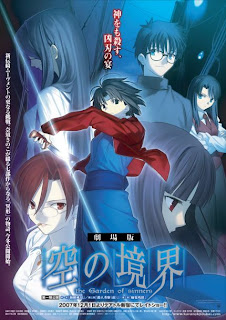Mirai...
I saw Mirai...
Kun comes across, through much of the feature, as an annoying and unlikable little brat. Eventually, we discover that the apple doesn't fall too far from the tree and, while Kun and his sister don't always see eye to eye, Kun's attitude towards his sister does mellow a bit and Kun himself does seem to change for the better by the end of the feature. There are, of course, no naughty bits, bloodshed or gore to speak of. Mirai is beautifully rendered and has a clean well-polished look that I've come to expect in more recent features.
 Mirai is a dramatic character study that follows the intertwined intricacies of Kun's family and explores the relationship between Kun and his sister. Mirai is a bit more esoteric than the Girl Who Leapt Through Time, but, was nonetheless quite compelling in its own way. The feature is told in a series of time-travel vignettes that each reveal a different aspect of Kun's family or Kun himself. Overall, Mirai might not be for everyone, but, I enjoyed the feature quite a lot and I would give Mirai a 3 out of 5.
Mirai is a dramatic character study that follows the intertwined intricacies of Kun's family and explores the relationship between Kun and his sister. Mirai is a bit more esoteric than the Girl Who Leapt Through Time, but, was nonetheless quite compelling in its own way. The feature is told in a series of time-travel vignettes that each reveal a different aspect of Kun's family or Kun himself. Overall, Mirai might not be for everyone, but, I enjoyed the feature quite a lot and I would give Mirai a 3 out of 5.
Mirai tells the story of Kun, a young boy with a newborn sister, Mirai, and his struggle to find a place for himself in this new sister-dominated world. During a series of temper tantrums in the garden outside his home, Kun, unwittingly stumbles into a series of time-travelling adventures, some of which are amusing and others, somewhat terrifying -- at least from Kun's point of view. Along the way, Kun learns more about his sister, himself and his family.A young boy named Kun feels forgotten by his family when his little sister Mirai arrives. Running away from home, Kun stumbles upon a magical garden that serves as a time-travelling gateway where he encounters his mother as a little girl and has a series of adventures with his baby sister, who is all grown up, opening a new perspective on his world.
Kun comes across, through much of the feature, as an annoying and unlikable little brat. Eventually, we discover that the apple doesn't fall too far from the tree and, while Kun and his sister don't always see eye to eye, Kun's attitude towards his sister does mellow a bit and Kun himself does seem to change for the better by the end of the feature. There are, of course, no naughty bits, bloodshed or gore to speak of. Mirai is beautifully rendered and has a clean well-polished look that I've come to expect in more recent features.
 Mirai is a dramatic character study that follows the intertwined intricacies of Kun's family and explores the relationship between Kun and his sister. Mirai is a bit more esoteric than the Girl Who Leapt Through Time, but, was nonetheless quite compelling in its own way. The feature is told in a series of time-travel vignettes that each reveal a different aspect of Kun's family or Kun himself. Overall, Mirai might not be for everyone, but, I enjoyed the feature quite a lot and I would give Mirai a 3 out of 5.
Mirai is a dramatic character study that follows the intertwined intricacies of Kun's family and explores the relationship between Kun and his sister. Mirai is a bit more esoteric than the Girl Who Leapt Through Time, but, was nonetheless quite compelling in its own way. The feature is told in a series of time-travel vignettes that each reveal a different aspect of Kun's family or Kun himself. Overall, Mirai might not be for everyone, but, I enjoyed the feature quite a lot and I would give Mirai a 3 out of 5.


